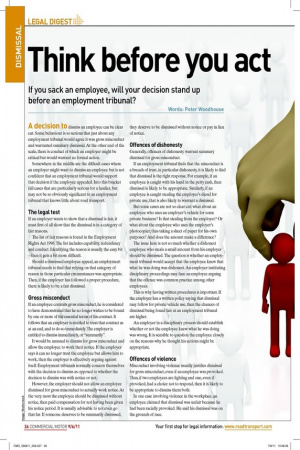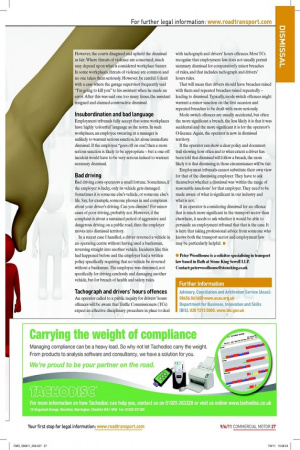Think before you act
Page 21

Page 22

If you've noticed an error in this article please click here to report it so we can fix it.
If you sack an employee, will your decision stand up before an employment tribunal?
Words: Peter Woodhouse Adecision to dismiss an employee can be clear cut. Some behaviour is so serious that just about any employment tribunal would agree it was gross misconduct and warranted summary dismissal. At the other end of the scale, there is conduct of which an employer might be critical but would warrant no formal action.
Somewhere in the middle are the dificult cases where an employer might want to dismiss an employee but is not conident that an employment tribunal would support that decision if the employee appealed. Into this bracket fall cases that are particularly serious for a haulier, but may not be so obviously signiicant to an employment tribunal that knows little about road transport.
The legal test
If an employer wants to show that a dismissal is fair, it must irst of all show that the dismissal is in a category of fair reasons.
The list of fair reasons is found in the Employment Rights Act 1996. The list includes capability, redundancy and conduct. Identifying the reason is usually the easy bit – then it gets a bit more dificult.
Should a dismissed employee appeal, an employment tribunal needs to ind that relying on that category of reason in those particular circumstances was appropriate. Then, if the employer has followed a proper procedure, there is likely to be a fair dismissal.
Gross misconduct
If an employee commits gross misconduct, he is considered to have demonstrated that he no longer wishes to be bound by one or more of the essential terms of his contract. It follows that an employer is entitled to treat that contract as at an end, and to do so immediately. The employer is entitled to dismiss immediately, or “summarily” .
It would be unusual to dismiss for gross misconduct and allow the employee to work their notice. If the employer says it can no longer trust the employee but allows him to work, then the employer is effectively arguing against itself. Employment tribunals normally concern themselves with the decision to dismiss as opposed to whether the decision to dismiss was with notice or not.
However, the employer should not allow an employee dismissed for gross misconduct to actually work notice. At the very most the employee should be dismissed without notice, then paid compensation for not having been given his notice period. It is usually advisable to not even go that far. If someone deserves to be summarily dismissed, they deserve to be dismissed without notice or pay in lieu of notice.
Offences of dishonesty
Generally, offences of dishonesty warrant summary dismissal for gross misconduct.
If an employment tribunal inds that the misconduct is a breach of trust, in particular dishonesty, it is likely to ind that dismissal is the right response. For example, if an employee is caught with his hand in the petty cash, then dismissal is likely to be appropriate. Similarly, if an employee is caught stealing the employer’s diesel for private use, that is also likely to warrant a dismissal.
But some cases are not so clear cut: what about an employee who uses an employer’s vehicle for some private business? Is that stealing from the employer? Or what about the employee who uses the employer’s photocopier, thus taking a sheet of paper for his own purposes? And does the amount make a difference?
The issue here is not so much whether a dishonest employee who steals a small amount from his employer should be dismissed. The question is whether an employment tribunal would accept that the employee knew that what he was doing was dishonest. An employer instituting disciplinary proceedings may face an employee arguing that the offence was common practice among other employees.
This is why having written procedures is important. If the employer has a written policy saying that dismissal may follow for private vehicle use, then the chances of dismissal being found fair at an employment tribunal are higher.
An employer in a disciplinary process should establish whether or not the employee knew what he was doing was wrong. It is sensible to question the employee closely on the reasons why he thought his actions might be appropriate.
Offences of violence
Misconduct involving violence usually justiies dismissal for gross misconduct, even if an employee was provoked. Thus, if two employees are ighting and one, even if provoked, had a choice not to respond, then it is likely to be appropriate to dismiss them both.
In one case involving violence in the workplace, an employee claimed that dismissal was unfair because he had been racially provoked. He said his dismissal was on the grounds of race. However, the courts disagreed and upheld the dismissal as fair. Where threats of violence are concerned, much may depend upon what is considered workplace banter. In some workplaces, threats of violence are common and no one takes them seriously. However, be careful: I dealt with a case where the garage supervisor frequently said “I’m going to kill you” to his assistant when he made an error. After this was said one too many times, the assistant resigned and claimed constructive dismissal.
Insubordination and bad language
Employment tribunals fully accept that some workplaces have highly ‘colourful’ language as the norm. In such workplaces, an employee swearing at a manager is unlikely to warrant serious sanction, let alone immediate dismissal. If the employee “goes off on one”, then a more serious sanction is likely to be appropriate – but a one-off incident would have to be very serious indeed to warrant summary dismissal.
Bad driving
Bad driving costs operators a small fortune. Sometimes, if the employer is lucky, only its vehicle gets damaged. Sometimes it is someone else’s vehicle, or someone else’s life. Say, for example, someone phones in and complains about your driver’s driving. Can you dismiss? For minor cases of poor driving, probably not. However, if the complaint is about a sustained period of aggressive and dangerous driving on a public road, then the employer moves into dismissal territory.
In a recent case I handled, a driver reversed a vehicle in an operating centre without having used a banksman, reversing straight into another vehicle. Incidents like this had happened before and the employer had a written policy speciically requiring that no vehicle be reversed without a banksman. The employee was dismissed, not speciically for driving carelessly and damaging another vehicle, but for breach of health and safety rules.
Tachograph and drivers’ hours offences
An operator called to a public inquiry for drivers’ hours offences will be aware that Trafic Commissioners (TCs) expect an effective disciplinary procedure in place to deal with tachograph and drivers’ hours offences. Most TCs recognise that employment law does not usually permit summary dismissal for comparatively minor breaches of rules, and that includes tachograph and drivers’ hours rules.
That will mean that drivers should have breaches raised with them and repeated breaches raised repeatedly – leading to dismissal. Typically, mode switch offences might warrant a minor sanction on the irst occasion and repeated breaches to be dealt with more seriously.
Mode switch offences are usually accidental, but often the more signiicant a breach, the less likely it is that it was accidental and the more signiicant it is for the operator’s O-licence. Again, the operator is now in dismissal territory.
If the operator can show a clear policy and document trail showing how often and to what extent a driver has been told that dismissal will follow a breach, the more likely it is that dismissing in those circumstances will be fair.
Employment tribunals cannot substitute their own view for that of the dismissing employer. They have to ask themselves whether a dismissal was ‘within the range of reasonable sanctions’ for that employer. They need to be made aware of what is signiicant in our industry and what is not.
If an operator is considering dismissal for an offence that is much more signiicant in the transport sector than elsewhere, it needs to ask whether it would be able to persuade an employment tribunal that that is the case. It is here that taking professional advice from someone who knows both the transport sector and employment law may be particularly helpful. ■
● Peter Woodhouse is a solicitor specialising in transport law based in Bath at Stone King Sewell LLP. Contact: peterwoodhouse@stoneking.co.uk















































